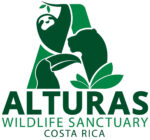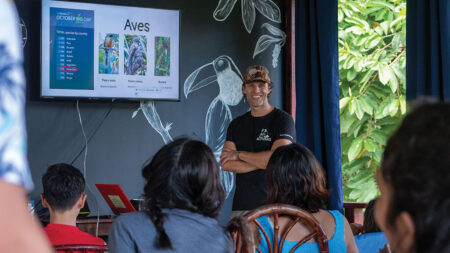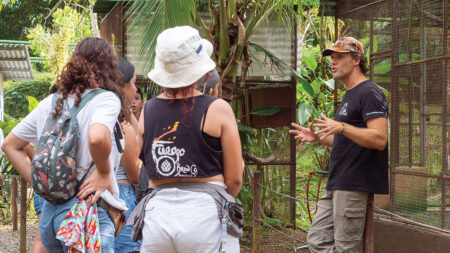Changing Attitudes Towards Wild Animals When Attitudes Don’t Want to Change

 By Ryan Meczkowski, Tour and Education Coordinator
By Ryan Meczkowski, Tour and Education Coordinator
Standing in front of the classroom, with 25 young faces watching and hanging on my every word, I knew this was the opportunity for a breakthrough. As the Education Coordinator at Alturas Wildlife Sanctuary, addressing a group of local students about protecting sea turtles, I was about to highlight why poaching turtle nests was wrong. I presented the class with a question: Why do some people in Costa Rica eat turtle eggs? The response came from the teacher observing from her desk. “Because they’re delicious! With lemon juice and Tabasco, they go down smoothly.” Momentum gone. I could almost hear the record scratch. Here was a person in charge of forming the minds of young people, not only advocating the consumption of turtle eggs, but gleefully doing so. This experience illustrates one of the biggest challenges in teaching sustainability. With a growing human population, the pressures on wildlife and ecosystems are increasing and we need to change our lifestyles in order to preserve our natural places for future generations. However, cultural norms are often resistant to the changes that need to be made.
 When governments make decisions to protect wildlife, they cannot separate humans from the equation. Cultural, political, and socio-economic needs must be taken into consideration in order for conservation efforts to be successful. Costa Rica knows this, which is why the country is a model for how conservation and economic growth can coexist. However, while Costa Rica deservedly has a lot to be proud of, illegal activities, such as hunting and possessing wild animals as pets, still occur with frequency. Often these practices go back generations and to ask people to stop is asking them to abandon tradition.
When governments make decisions to protect wildlife, they cannot separate humans from the equation. Cultural, political, and socio-economic needs must be taken into consideration in order for conservation efforts to be successful. Costa Rica knows this, which is why the country is a model for how conservation and economic growth can coexist. However, while Costa Rica deservedly has a lot to be proud of, illegal activities, such as hunting and possessing wild animals as pets, still occur with frequency. Often these practices go back generations and to ask people to stop is asking them to abandon tradition.
Education is key, but change doesn’t happen overnight. Real change is a long process that takes commitment and patience. Being able to convince one person not to kill a snake because it provides services for an ecosystem, such as controlling rodent populations, is an achievement itself. Furthermore, providing alternative actions, such as contacting a wildlife rescue center to relocate the snake, helps in changing behaviors. Rescue centers, such as Alturas Wildlife Sanctuary, are committed to educating people how to coexist with wild animals in regions of high biodiversity. In addition to teaching environmental education at local schools, Alturas uses their sanctuary tours as an opportunity to explain wildlife tourism ethics. One example is informing tourists that feeding capuchin monkeys changes the animal’s natural behavior, resulting in dependency on humans for food and forgetting how to forage or hunt on its own, which can lead to the animal dying from starvation. The opportunity to enlighten others on proper wildlife viewing is a step closer to a world in which humans, animals, ecosystems, businesses, and institutions can coexist in equilibrium. This is not done through shaming, but rather by acknowledging differences and looking for collaborative opportunities in which we can all live in harmony with each other.
Contact us at [email protected] & 506-8609-5363.
Visit us online at alturaswildlifesanctuary.org,
facebook.com/alturaswildlifesanctuary,
instagram.com/alturaswildlife
